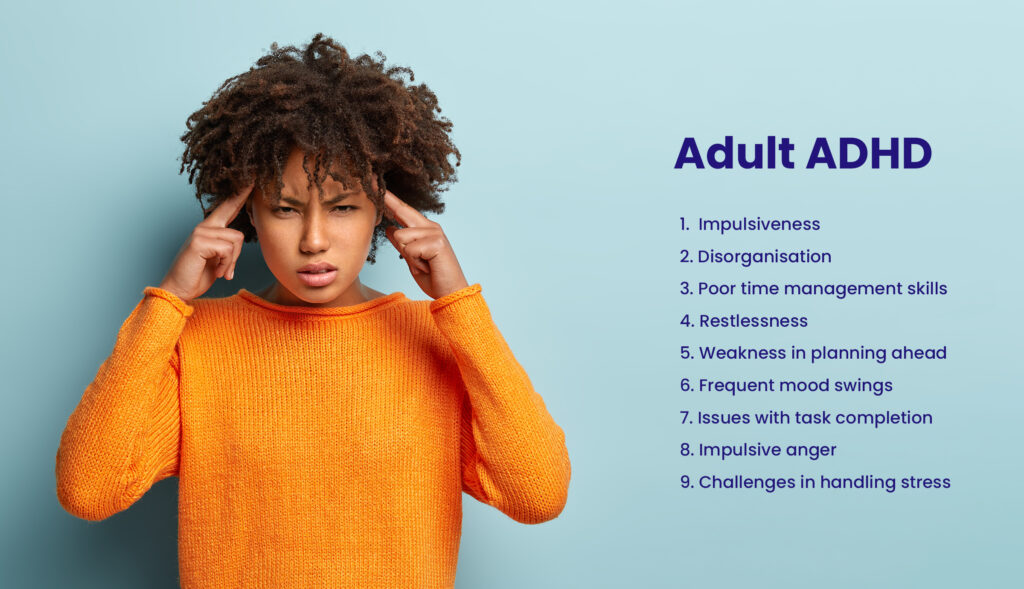
ADHD has become an established topic in discussions surrounding mental health, with more and more adults, especially women, searching for analysis and remedy.
This article explores the dynamics of ADHD, its signs and symptoms, the diagnostic process, and the rising trend of grownup diagnoses. Drawing insights from personal reports and professional reviews, we delve into the motives behind the surge in adult ADHD diagnoses and the evolving panorama of ADHD focus and treatment.
Understanding ADHD
ADHD is a neurodevelopmental disease characterised by chronic patterns of inattention, hyperactivity, and impulsivity, substantially impacting day-to-day functioning. Unlike occasional distractions, people with ADHD revel in demanding situations that go beyond the regular demands of present-day existence. The sickness often manifests in childhood, affecting about one in 20 youngsters, but can persist into adulthood.
Diagnosing ADHD
Diagnosing ADHD involves a holistic assessment conducted by mental health professionals. Typically, psychiatrists or psychologists evaluate the individual’s history, behaviours, and cognitive functions. ADHD overlaps with other mental illnesses, so a formal diagnosis is critical to identify the appropriate treatment route accurately.

Challenges in Diagnosis, Especially for Adults
ADHD in adults, especially women, has historically been underdiagnosed. The symptoms for women may differ from those exhibited by children, making identification challenging.
Adult ADHD can manifest as inattentiveness, which can impact focus and task completion rather than hyperactivity. Recognising these subtle signs is difficult. Therefore, it has contributed to the recent rise in adult diagnoses.

The Role Social Media Plays in Increasing Awareness
The increase in adult ADHD diagnoses is attributed, in part, to the increased awareness of the disorder by social media platforms like TikTok and Instagram. Content creators and influencers openly sharing their ADHD experiences have destigmatised the condition, encouraging individuals to seek professional assessments. The digital space has created a safe space and has a key role in breaking down the historical stigmas associated with ADHD.
Treatment Approaches for ADHD
While there may be no permanent solution for ADHD, a combination of pharmaceutical and behavioural healing procedures is the commonplace remedy route.
Medications together with methylphenidate (Ritalin) and dextroamphetamine can be prescribed, with their efficacy varying among kids and adults. Behavioural therapy specialises in developing strategies to manage ADHD signs, which includes mindfulness strategies, sensory strategies, and Cognitive Behavioural Therapy (CBT).
Controversies and Concerns
The rise in adult ADHD diagnoses has sparked conversations about overdiagnosis. Confirmation bias, amplified by social media algorithms, may contribute to individuals seeking diagnoses based on popular trends rather than clinical necessity. However, experts argue that the mental health system’s quality control remains robust, ensuring accurate diagnoses and appropriate interventions.
The Future of ADHD Management
Australia is on the brink of a paradigm shift in managing ADHD. They are releasing the first Australian Evidence-Based Clinical Guideline for ADHD, which will help medical practitioners to standardise diagnosis, treatment, and support.
Advocacy for increased professional training and improved accessibility to mental health services remains crucial to addressing the growing demand for ADHD assessments, reducing waiting times, and enhancing overall support.
Conclusion:
As more adults seek ADHD assessments, the conversation around ADHD is evolving. Increased awareness, fuelled by social media and upcoming clinical guidelines, is reshaping perceptions and breaking down stigma. While challenges such as overdiagnosis concerns and limited resources persist, the recognition and understanding of ADHD in adults mark a significant step toward an inclusive and supportive mental health space.


